How To Add Transparent Background In Krita

This is the second part of the tutorial where we will continue discussing on how we tin use colorize mask in Krita. If you oasis't watch the commencement function, then yous should do that first before watching this one. In the commencement part we have discussed the basics and in this second part video we will comprehend more advanced topics and tips to actually brand use of the colorize mask in our workflow. Okay.
Colorize mask tutorial video:
Colorize mask written commodity:
Creating transparent line artwork
Now let's hash out about the line artwork types. Besides transparent line artwork, Colorize Mask support non-transparent line artwork like this one.
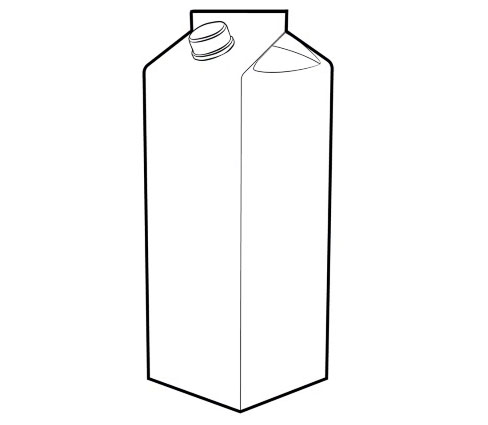
This is a black line artwork on a solid white color. Unlike what we have earlier which is on a transparent layer. Nosotros tin can run across if I select the "colorize mask editing" tool and click on this layer. We can apace colorize this layer besides just similar how we did with the transparent line artwork.

Every bit nosotros can see fifty-fifty if yous don't have transparency in your line artwork, colorize mask will work every bit well. Sometimes we do need to work with non transparent line artwork similar this, if for example nosotros created the line artworks using a real paper and then scan that paper into a digital image. Okay.
At present although you can utilize non-transparent layers for the line artwork, you demand to understand that this type of line artwork is non actually the ideal type that you want to utilize with colorize mask. I strongly recommend you to use the transparent type, similar the one we used before. Why? Because, past using a not-transparent layer, you will non be able to use a characteristic called transparent fundamental color. Nosotros will discuss that feature later after this. For now, I want to prove yous how to convert a non-transparent line artwork like this, into a transparent line artwork type in Krita. And so to do this, commencement make certain the layer is selected. Then yous want to invert the color. To capsize the color you lot simply press Ctrl + I. If you forget the shortcut you lot can also access it from the "filter" menu, "adapt", and and so choose "invert".
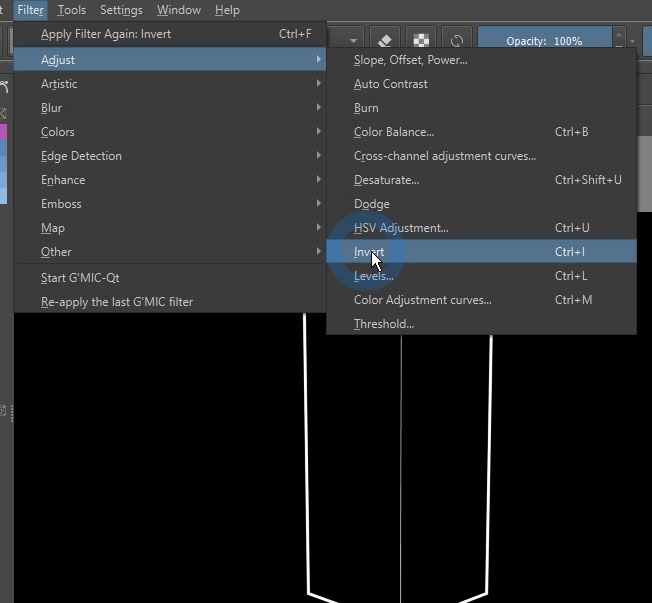
Okay. Next nosotros need to right click on the layer. Choose "convert" and then choose "transparency mask".
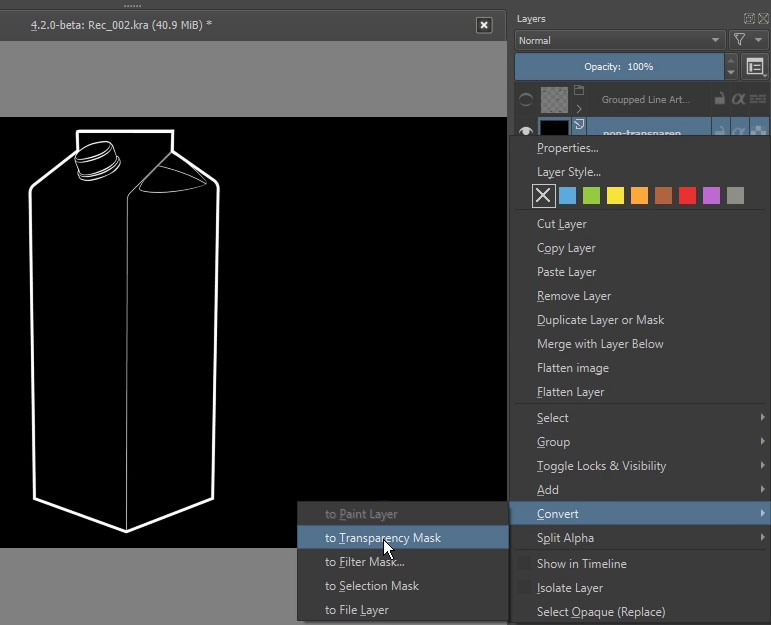
Now you may call up that something very odd just happened here and that Krita has some kind of problems. Detect now nosotros can not see the orange background anymore.
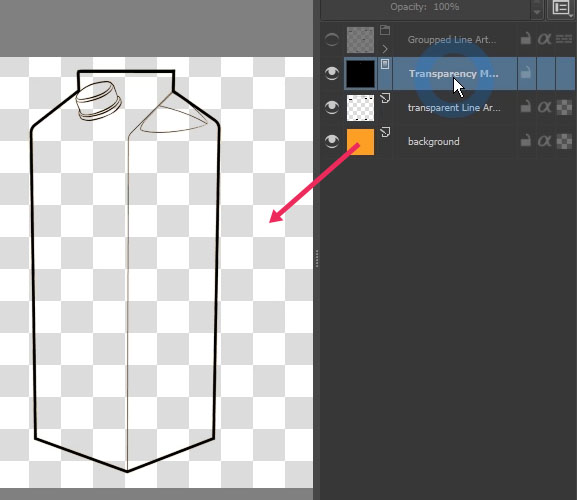
Now, there is no problems hither. What but happened is that Krita created a transparency mask. Simply the transparency mask doesn't have any parent layer. Essentially it's now parented to the whole image composition. And so it'southward affecting everything including the orange background layer. To ready this, all nosotros need to do now is to create a new layer and parent the transparency mask to that new layer. Okay.
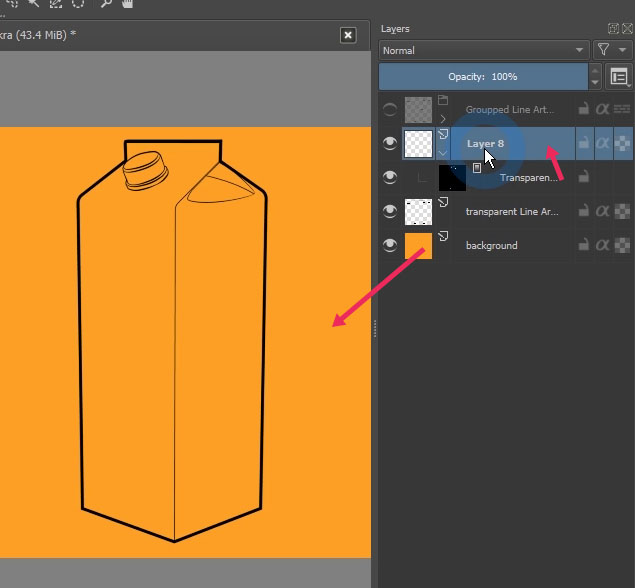
In the new layer we can draw annihilation with whatsoever colour, but what is visible in this layer is now controlled past the transparency mask.

If yous desire to have just a plain black color line artwork, so just press D to get the default colors, which is basically set the foreground color to black and the background color to white. Pressing D is the same as pressing this small button up here.
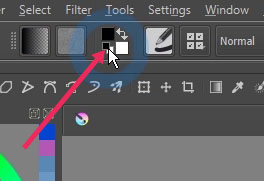
And then just printing Shift + Backspace to fill up the layer with the foreground color. Subsequently that we can flatten the layer by right clicking on the layer and so choose "flatten layer". Delight be enlightened, not "flatten image" but "flatten layer". Okay. At present the transparency mask is gone but the effect of it is applied on the layer. And then nosotros have a transparent based line artwork which is the platonic line artwork blazon for the colorize mask.

Transparent key color
The biggest benefit of having an on transparent line artwork is to have transparent primal color while doing colorize mask. Allow me show y'all how it works. Let's use the colorize mask tool over again and click on this layer. Let's add some colors again only similar before on the milk box. Okay. Now permit'southward say, we want to make this outer surface area transparent.

To practise that we can pick whatsoever color, any color you like every bit long information technology does non be inside the solid region. For example this red color. At present we want to put that color in the outer area. Y'all can draw any stroke shape that you like information technology doesn't have to be X like this.

Now let's focus our attention on this color tabular array. Krita listed all of the active colors that we utilise for this colorize mask in this color table.

At present make sure the red color is selected. And so click this "transparent" button in here. Detect now Krita volition register this ruddy color as the transparent colour.

And so now, if nosotros click update, wait for the process to cease then plow off the edit mode. The outer area volition exist rendered as transparent. Now we can see the orange groundwork layer beneath this layer.
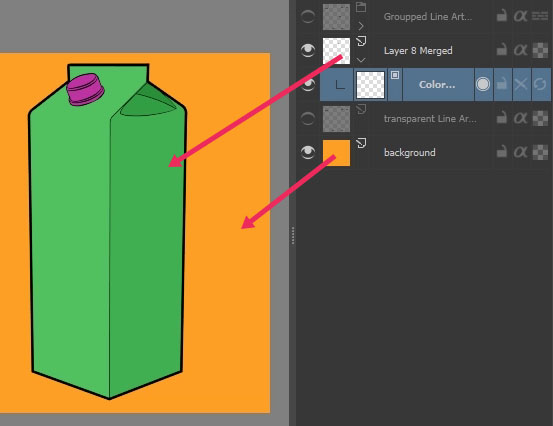
Grouped line artwork
Ane of the greatest characteristic that Krita has over the other graphic applications is the layer encapsulation. I don't exactly know the official terms for this feature of behavior. Merely essentially in Krita, if you take layers inside a group layer. That group layer from outside will be treated just like a simple flat layer. This may sounds simple, just actually, information technology gives huge benefit when working on complex composition. If you lot need to do this in Photoshop for instance, you would have to rely on smart objects which can exist very difficult to work with, because you lot tin non see the relation to the main composition when editing a smart object. Basically in making complex limerick Krita is clearly the winner.
One usage scenario of layer encapsulation is when we demand to piece of work on complex line artworks. Allow'due south say you already done the basic line arts. For example similar this one.
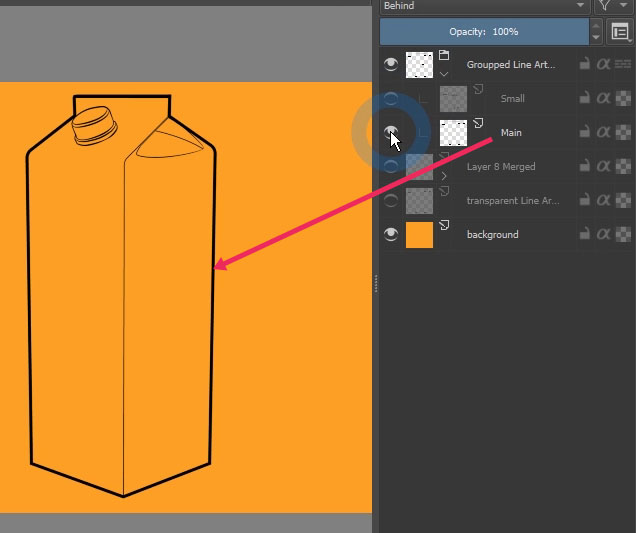
And so you need to create some other pass for smaller and more detailed lines. With Krita, you don't have to do all of them in a unmarried layer. You can just create them on a new different layer, similar this one for example.

As you can run into at this layer, this line is not forming a close loop because information technology doesn't have to. Likewise the bottom ones, they just open ended like that.
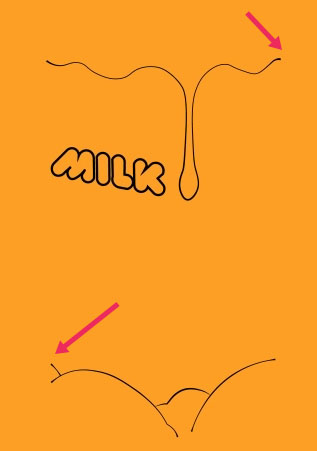
But when both layers visible, and we put these layers inside a group. This group layer now act equally the representative of these two layers combined of flattened together. And so if we apply colorize mask on this group layer, everything volition just work as expected. Remember we're applying the colorize mask on the group layer non on the individual line artworks layers inside the group.

And but like before, add together key colors equally y'all like then click the update push. Okay, so at that place yous go, adding colorize mask on a group layer. This method opens up many workflow variations and flexibility. For example you can create lines to define shading and highlight color regions. After you do colorize mask you can simply hide the layer if you don't want information technology to appear.
Converting colorize mask
Depending on the art style you want to after, sometimes y'all don't desire to take flat colored look. Perhaps you desire to tweak the color more to give information technology more than texture or more painterly look to it. If that is the case you may want to convert the colorize mask to an ordinary paint layer. To exercise that just right click on the layer, "convert" so choose "paint layer" in here.

At present we accept an ordinary pigment layer, not a mask anymore. That is why it is blocking the line artworks layer beneath information technology. Just press the layer down button a couple of times until it is located beneath the line artworks layer. And just do what you need to exercise with the new paint layer.

Okay guys that's it for now. If you want to learn Krita from scratch, and master all of the in-depth digital painting skills in the shortest fourth dimension possible. So you should definitely join my Udemy course "Krita basic to avant-garde digital painting".

I besides have this course at Skillshare if you adopt to utilize Skillshare.

This grade will guide anyone from the very bones, step by step to the advanced level. So fifty-fifty if you have never used Krita before or any graphic software whatever. Yous are proficient to go. You volition learn a lot of things in-depth in this form. From the central concepts to the technical side of things. Yous'll have many different hands on projects with different variety of styles to practice.
Check out my other Krita tutorials. Wassalamualaikum.
How To Add Transparent Background In Krita,
Source: https://kritatutorials.com/how-to-add-color-quickly-in-krita-using-colorize-mask-part-2/
Posted by: bastarachemeself.blogspot.com


0 Response to "How To Add Transparent Background In Krita"
Post a Comment